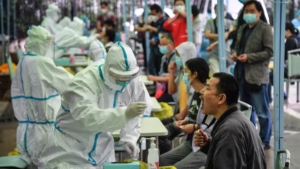Already a subscriber? Make sure to log into your account before viewing this content. You can access your account by hitting the “login” button on the top right corner. Still unable to see the content after signing in? Make sure your card on file is up-to-date.
The United States and Argentina have announced their withdrawal from the World Health Organization (WHO), unveiling plans to establish an alternative international health system rooted in “scientific integrity, national sovereignty, and transparency.”
Some shit you should know before you read: If you’re unaware, the WHO is a United Nations agency responsible for coordinating global health responses, offering guidance during health crises, and supporting disease prevention, vaccination programs, and emergency response efforts across nations. President Donald Trump has repeatedly criticized the WHO during and after the COVID-19 pandemic, accusing the organization of severe mismanagement and bias, particularly in its relationship with China. Trump and his administration claimed that the WHO had uncritically accepted Chinese government data in the early stages of the outbreak and failed to challenge their lack of transparency, allowing the virus to spread globally before meaningful action could be taken. One of the most pointed criticisms was that the WHO allowed China to delay an international investigation into the origins of COVID-19 for more than a year, with WHO investigators not gaining access to Wuhan until January 2021, well after the initial outbreak.

What’s going on now: In a notable development, HHS Secretary Robert F. Kennedy Jr. and Argentine Minister of Health Mario Lugones issued a joint statement formally announcing the US and Argentina’s withdrawal from the WHO, citing the organization’s alleged failures and politicization. In a joint statement, both said that “The WHO’s handling of the COVID-19 pandemic revealed serious structural and operational shortcomings that undermined global trust and highlighted the urgent need for independent, science-based leadership in global health.”
Both governments also criticized the WHO for prioritizing “political interests and bureaucratic structures” over genuine public health needs, stating that the agency “failed to provide critical access to information, impairing countries’ ability to act swiftly and effectively, with devastating global consequences.”
As an alternative, the US and Argentina announced plans to build a new “modern global health cooperation model” that will be “grounded in scientific integrity, transparency, sovereignty, and accountability.” This new system aims to focus on cost-effective, evidence-based public health measures, particularly those that emphasize prevention. The announcement highlighted a commitment to addressing the root causes of illness such as “environmental toxins, nutritional deficiencies, and food safety standards,” and noted that the new approach would prioritize “real science” over “political control.”







